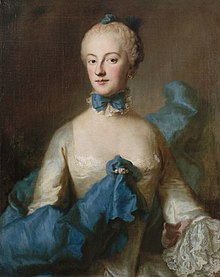Duchess Maria Anna Josepha of Bavaria
| Maria Anna Josepha of Bavaria | |
|---|---|
 Portrait by Georg Desmarées, c. 1755 | |
| Margravine consort of Baden-Baden | |
| Tenure | 20 July 1755 – 22 October 1761 |
| Born | 7 August 1734 Nymphenburg Palace, Munich |
| Died | 7 May 1776 (aged 41) Nymphenburg Palace, Munich |
| Burial | |
| Spouse | |
| House | Wittelsbach |
| Father | Charles VII, Holy Roman Emperor |
| Mother | Maria Amalia of Austria |
Maria Anna Josepha of Bavaria (Maria Anna Josepha Augusta; 7 August 1734 – 7 May 1776) was a Duchess of Bavaria by birth and Margravine of Baden-Baden by marriage. She was nicknamed the savior of Bavaria. She is also known as Maria Josepha and is sometimes styled as a princess of Bavaria.
Biography
[edit]Maria Anna Josepha was born at the Nymphenburg Palace in 1734. She was the fifth child of Charles Albert, Elector of Bavaria (later Holy Roman Emperor) and his wife Maria Amalia of Austria. She was baptised with the names Maria Anna Josepha Augusta. A member of the House of Wittelsbach, rulers of the Electorate of Bavaria, she was styled a Duchess of Bavaria.
She married Louis George of Baden-Baden, the ruling Margrave of Baden-Baden and son of the late Louis William of Baden-Baden and his wife Sibylle of Saxe-Lauenburg, the latter was the regent of Baden-Baden for the infant Louis George. The couple were married at the Schloss Ettlingen in Baden on 20 July 1755; the bride was aged 20, the groom 53. The couple remained childless;[1] although Louis George did have one surviving daughter, Elisabeth, from his previous marriage, but as a female she was barred from the succession to the Margraviate.
Her husband had been married previously to Maria Anna of Schwarzenberg[1] by whom he had four children but only one survived infancy. Maria Anna was the only daughter of Prince Adam Franz Karl of Schwarzenberg and Eleonora of Lobkowicz.
Her husband died in 1761 and was succeeded by his brother Augustus George, Margrave of Baden-Baden. As such, his wife the Belgian born Maria Victoire d'Arenberg became the most important female at the court of Baden-Baden.
Maria Anna developed a great passion for diplomacy. She forged links with Frederick II of Prussia in order to protect the Bavarian throne as her brother, Maximilian III Joseph, was childless and feared for the succession.[2]
As a widow, Maria Anna Josepha returned to her native Bavaria where she died at the Nymphenburg Palace in Munich, over a year before her brother. She was buried at the Theatine Church, Munich, traditional burial place of Bavarian royalty.
Ancestors
[edit]| Ancestors of Duchess Maria Anna Josepha of Bavaria[3] |
|---|
References
[edit]- ^ a b "Ludwig Georg von Baden-Baden". Baden State Museum. Archived from the original on 2010-09-18. Retrieved 2010-06-29.
- ^ Bavaria later went to Charles Theodore, Elector of Bavaria (1777), a cousin of the Sulzbach line of the House of Wittelsbach
- ^ Genealogie ascendante jusqu'au quatrieme degre inclusivement de tous les Rois et Princes de maisons souveraines de l'Europe actuellement vivans [Genealogy up to the fourth degree inclusive of all the Kings and Princes of sovereign houses of Europe currently living] (in French). Bourdeaux: Frederic Guillaume Birnstiel. 1768. p. 40.
External links
[edit]![]() Media related to Maria Anna Josepha of Bavaria at Wikimedia Commons
Media related to Maria Anna Josepha of Bavaria at Wikimedia Commons
- German royalty
- 1734 births
- 1776 deaths
- 18th-century German people
- 18th-century German women
- Princesses in the Holy Roman Empire
- House of Wittelsbach
- Margravines of Baden-Baden
- Nobility from Munich
- House of Zähringen
- Duchesses of Bavaria
- Burials at the Theatine Church, Munich
- Daughters of emperors
- Children of Charles VII, Holy Roman Emperor
- Daughters of kings
